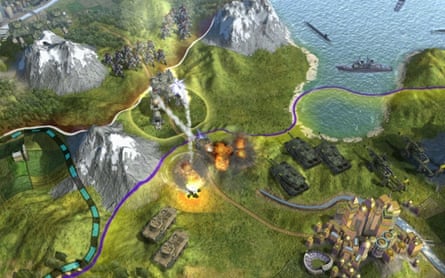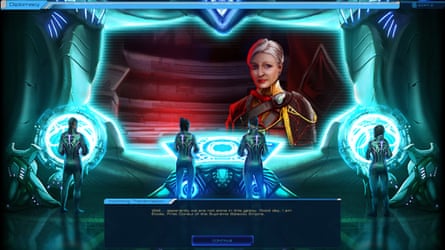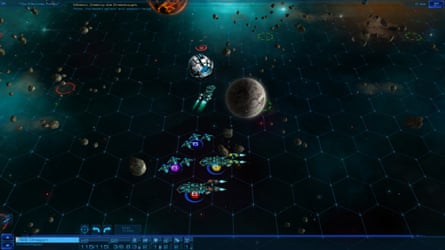“Oh, it was a sad and dark time! We had to make our own fun,” says Sid Meier before his mock-sorrow dissolves into laughter. We’ve just asked him about the games he grew up with.
Given that Meier was born in 1954, those games weren’t played on a screen, yet they nevertheless had a strong influence on the video games he went on to create as an adult, from the seafaring adventure Pirates! to his seminal strategy series Civilization, and the upcoming title Starships.
“I grew up with some board games, and there were also a few war games, then the hex games that I got into a little later,” he says. “Instead of Lego or soldiers on the screen I had real Lego and real toy soldiers.”
“We maybe used our imaginations a little bit more in those days than we have to today. Reading was my growing-up equivalent to playing video games. If there was something I was interested in – pirates, the civil war, airplanes – I would go libraries and get books on it.
“That was my way of experiencing those cool things. And of course, in the early days of making computer games, we had to rely on players’ imagination: we only had four colours and one channel of sound!”
After graduating with a computer science degree, Meier’s career in game development began in 1982 when he co-founded the development studio Microprose. The company was famous for its compelling battle simulations; games like Spitfire Ace, F-15 Strike Eagle, Silent Service and Gunship brought unparalleled accuracy, aided by the experiences of Meier’s business partner Bill Stealey, an ex-airforce pilot.
In 1987, though, Meier designed a new type of game, Pirates!, an intriguing simulation of life as a 17th century privateer, exploring the oceans, trading and fighting. Concerned that Microprose fans wouldn’t recognise this diversion from the designer’s usual titles, the duo decided to put Sid’s name on the box, although Stealey has an excellent anecdote that it was actually the late Robin Williams, a keen gamer, who told Meier to add his name to Microprose titles. Whatever the case, it’s been a permanent fixture of his titles ever since, making him a bona-fide gaming brand, and one of the first true video game stars.
But there is one title with which he is most readily synonymous: Civilization. The groundbreaking strategy sim, which tasks players with leading their own tribe from prehistoric obscurity to modern day world domination is a compulsive, fascinating classic, spawning four sequels and a range of add-ons and spin-off. It is the thread running through his career.
Back then, however, there was trepidation around using the complexities of classic board-based war games in a computer title. “When we introduced Civilization, it was a risk,” he says. “Up to that time there had been very few strategy games: there was SimCity and a couple of others. We were afraid to use hexes! We used squares in the first Civilization because it was too scary to put hexes in there. But the world has since become a little more accepting of strategy. We’re happy to see it surviving: the kind of games we enjoy playing and making.”
Meier says his philosophy when creating games has always been to ask “who’s having the most fun in this world?”, whether it’s a pirate captain or a civilisation’s leader. “Pirates! was designed more around your fantasy of pirates than the actual reality,” he admits. “That allowed you to bring in all the stuff from the movies, whatever you had read, whatever was in your imagination. We wanted to tap into that with our games.”

I certainly learned new things from playing Meier’s games, though. As a 14-year-old, I once printed out the technology tree from Civilization – the branching diagram showing how discoveries led to new technologies and industrial trends – and proudly took it to school to show my history teacher. “You can’t learn history from a computer game, Stuart,” he told me. I didn’t agree, and still don’t. Thankfully, Meier’s in my corner on this one.
“That was the dirty little secret about our games: you actually do learn something,” he says. “Young people enjoy learning, even if they don’t necessarily enjoy being educated. There’s a lot of satisfaction in learning something, and watching your skill increase and coming to understand the map of the Caribbean or how one discovery led to another.”
“Learning is going to be part of any good video game: it gives you interesting challenges, and you learn by doing, not by being passively taught something. Once you’ve played a game, you’re a little smarter, a little more skilled than when you started.”
I never did convince my history teacher, but 23 years on – according to Meier – Civilization is being used in some educational courses. “We hear these stories from people: ‘I knew the entire geography of the Caribbean from Pirates! and amazed my teachers’ or ‘I knew this great world leader because I’d played Civilization’,” he says.
Meier talks about the longevity of that brand in particular and his approach – now within another games firm that he co-founded, Firaxis – to keeping Civilization fresh yet familiar in each new instalment.
“We have a rule: one third, one third, one third. For the next game, one third will stay the same: those core aspects. One third will be systems that we like but think could be improved, and one third will be new ideas,” he says.
“In fact, there should probably be another ‘third’ which is the one third we take out. Basically at this point, for every new thing we put in, we should take one thing out. We don’t want it to become overwhelming.”

The most recent game in the series was 2014’s Civilization: Beyond Earth, which focused on humanity’s galactic migration. His next game, Sid Meier’s Starships, follows on neatly.
Due for release in mid-March for PC and iOS, with a Mac version to follow, it sees you playing a spacecraft fleet captain, building ships and exploring the galaxy through battles and diplomacy. From the video footage released so far, it looks impressive.
“When I grew up, I loved Star Trek and Star Wars and all those inspirational sci-fi things,” he says. “I remember coming home and watching the original Star Trek series every Friday. And I’ve never had the chance to actually make a science fiction game.”
He says that the Firaxis art team was also “agitating” to do a sci-fi title. The company was working on Beyond Earth at the time, which Meier says provided the ideal jump-off point for a new game focusing more on the starships and intergalactic exploration.
“What is the core of the fun in this world? The cool thing is to be the commander of the starships. That’s the fun role. So we focused the game on building and customising your starships, taking them from one mission and adventuring to the next, and exploring the galaxy,” he says.
“My inspiration was almost like a Star Trek episode: you’ll arrive at a planet, this is the problem, and you’ve got to figure out how to solve it. And when you figure out the solution, you’re read to move on to the next adventure.”
Pray for any red-shirted crew members on your starships, then. Meier says that it’s impossible to avoid echoes of iconic space stories like Star Wars and Star Trek when making this kind of game, but sees the shared knowledge from those and other science fiction as beneficial. While Civilization drew on players’ knowledge of history – their understanding of gunpowder, the wheel, electricity and other advances – Starships can draw on science fiction concepts, from shields and lasers to cloaking technology.
“We’ve added our own twists,” he says. “One thing that was missing from Star Trek and Star Wars was, what are the tactics involved in fighting starships, and how can we make that interesting?” Negotiating the various environments – including hiding behind asteroids for protection – will, according to Meier, be a challenge to relish.

And yes, there are hexes. “It’s now safe to use hexes again in games! We always love hexes,” he laughs. “And it’s got that tactile look: you can almost reach out and touch those starships. There’s certainly a connection to the rich history of board gaming, which is a warm, familiar place for a lot of gamers.”
Play Starships on its smallest map, and you’ll likely finish the game in a couple of hours according to Meier. The biggest map provides 15-20 hours of gameplay. Except like all his previous titles, this is designed to be replayed regularly, testing out different craft and tactics.
Starships is also notable because it’s being released simultaneously for PC and iPad. Meier is no stranger to mobile – there have been various mobile versions of Civilization, as well as Pirates!, Railroad Tycoon and his recent Ace Patrol games. He says the only reason Firaxis made Starships for the iPad was that tablet technology has reached the point where he could make the same game with no compromises: it uses the same engine, the graphics are “almost” identical, and the game is well-suited to touchscreen controls.
He’s intrigued by the future possibilities of the tablet as a gaming device. “Is it just a bigger iPhone where you’re going to build iPhone kinda games, or a bigger platform that lends itself to strategy and games you’re going to find on a PC?” says Meier.
“We’re very interested in the answer to that question. We would like to see more strategy games appear on the iPad, and there seems to be an acceptance of that. We’re interested to see how it works out, but we want to reassure all our players that we’ve not abandoned the PC.
“There’s a bit of fear that we’ll abandon the PC and move from this platform to that platform, but PC remains our core platform. It’s where our fans tend to play our games. There are several times when people have been predicting that the PC is on its last legs, but it’s a great gaming platform.”
Taking Starships to iPad doesn’t mean ditching PC-style pricing, either: it will be $14.99 on all platforms. That means no freemium model, timers, pay-gates, or virtual gems being sold to rocket-charge your fleet’s progress.
“We want to emphasise that there are no micro-transactions: none of that in the game,” he says. “It’s a single price, and you get he whole game for that.” He talks about the “concern and suspicion” around badly-implemented freemium mechanics in mobile games, as well as Apple’s recent ‘Pay Once and Play’ promotion of non-freemium games.
“That model works very well for us. We can focus on making the best game that we can, rather than trying to figure out the whole paywalls and all the other aspects you have to stick in there. We’re happy to make games that don’t include microtransactions,” says Meier.
Expansions? They’re a different story. Firaxis has released expansion modules for Civilization games, based on feedback from players and ideas that didn’t make it into the main title. It will be interesting to see if the company sees any mileage in doing that with Starships a few months down the line.
What next, though? Long-term followers of Meier’s games may be hoping he’ll have another crack at the dinosaur-themed game he abandoned in early 2001, because he didn’t think it was fun enough. “I’d still love to figure it out some day,” he says. “Dinosaurs are one of those words that conjure up a lot in your mind: it’s an exciting topic. The challenge is, in this world, who’s having the most fun? What’s the cool place to be?
“I guess that’s to be a dinosaur, so that would tend to a first-person… claw-er? But what intrigues me is the whole idea of the evolution, the different varieties, so it missed what I felt was cool about dinosaurs. Then I thought about a more strategic game, with a herd, but it was hard to find the right place to put the player to be at the core of all the fun.”
Dinosaur starship captains? Pirate dinosaurs? Actually, book publisher Penguin might have something to say about that. Whatever Sid Meier’s imagination – honed in those not so sad and dark times before video games – comes up with next, it’ll be worth waiting for.

Comments (…)
Sign in or create your Guardian account to join the discussion